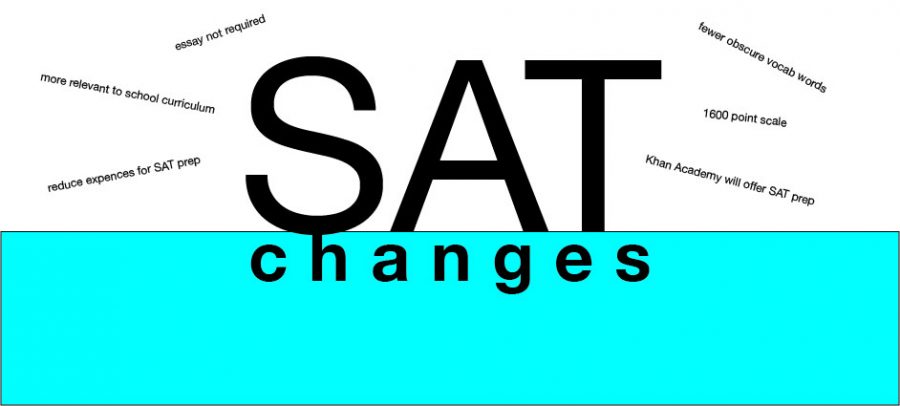by Emily Moss
Created in 1926 to test students’ potential for learning, the SAT remains one of the most highly anticipated tests for high school students today. Some students pay for tutoring courses in hopes of maximizing their scores, others purchase SAT books and study on their own, while still others look at the test for the first time on the day they take it.
However, starting in the spring of 2016, the College Board will implement a set of major changes to the SAT, including a return to a 1600-point scale, an optional, redesigned essay, and fewer “obscure” vocabulary words, according to college counselor Brad MacGowan.
Questions on the test will be less “coachable” and more relevant to the curriculum already taught in schools, said MacGowan. The College Board hopes that these changes will help to close the income achievement gap by reducing the need for expensive SAT preparatory courses that can give higher income students a significant advantage over their peers, according to College Board president David Coleman as quoted in the New York Times.
Studies show that students from the class of 2013 whose families earned over $200,000 a year scored an average of 388 total points higher than students from families who earned $20,000 a year or less, according to the National Center for Fair and Open Testing.
Khan Academy, a free online educational resource, will offer SAT preparation in coordination with the College Board in efforts to further level the playing field, according to founder Sal Khan on the organization’s website.
“Students will not have to learn the tricks of the test,” added MacGowan. “Preparing should be more like real education and less about test-taking strategies.”
Neil Chyten, the President of Chyten Premier Tutoring and Test Preparation, said that preparing for the new SAT may be harder than preparing for the current version, as questions on the new test are “more analytical in nature” and fewer practice materials will be available.
He added that he thinks that the changes to the test represent a “step in the right direction,” but that there will still likely be a score disparity related to income on the SAT and other tests. According to Chyten, it is very important to offer free and reduced-price SAT preparatory courses to students who are unable to pay the usual fees.
However, contrary to what the College Board believes, Chyten said he thinks that the new test will in fact be “coachable.”
“Change always makes people uncomfortable, so we feel very strongly that there will be an increase in the number of students who sign up for our programs,” he said.
According to Chyten, the company had its strongest year ever when the SAT was last revised in 2005. That year, the College Board initially decided to add the 25-minute essay portion and switch to the 2400-point scale, although Chyten thinks that the 2016 set of changes will be “much broader and more encompassing” than the previous set.
Julia Cohen ’06, who took the 2400-point SAT in 2005, said that many students in her grade were nervous about taking an unfamiliar version of the test and opted to take the old SAT before the changes were released.
Current freshmen will also have a choice of which version of the test to take, as the new SAT will not be put into effect until the spring of their junior year. According to Chyten, students who are particularly strong readers and writers today should consider taking the new 1600-point SAT, as the questions require higher-level thinking. International students may wish to take the ACT instead, said Chyten.
Cohen also warned freshmen not to worry about the test too far in advance. She said that the revisions to the test had little impact on the way she studied, and that colleges seemed to place less emphasis on the essay portion because they had so little experience with it.
“If you’re the first class that’s taking it, colleges will be sensitive to that,” Cohen said.










































